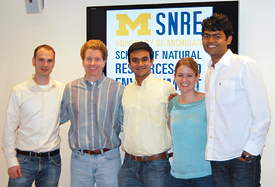
Energy efficiency and water purification projects at U-M earned top honors in the 2012 Dow Sustainability Innovation Student Challenge Award (SISCA).
Teams of master’s students representing the School of Natural Resources and Environment (SNRE), the College of Engineering, and the Stephen M. Ross School of Business won first and second prizes for U-M. Graduate students from 17 universities on five continents participated in this year’s event. The SISCA competition concluded on Dec. 6 with a global webcast and live chat among all participating universities and winning students.
SISCA is a global competition to generate inventive and interdisciplinary ideas for sustainability, sponsored by The Dow Chemical Company. This year at each university, first-place winners received $10,000 and the runners up earned $2,500.
A team of five Sustainable Systems students (combining SNRE and Engineering) won the first-place award for their proposal titled “Increasing Energy Efficiency in Buildings through Occupant Density Monitoring and Adaptive Control Algorithms.” This proposed energy saving system would use smart phones and Wi-Fi to track occupants inside a building and use the data for electric load and heating, ventilation, and cooling (HVAC) automation. The system also would sense occupant density in real-time and shut down power outlets and close airflow dampers in unoccupied places. The team plans on using their $10,000 award to develop and test a system prototype on the U-M campus.
“We are all very honored to receive this award and grateful for the opportunity to work with a company committed to sustainable practices,” said first-place team member Cara Bastoni. “Crafting a winning proposal was also a very important exercise as it helped our team focus in on the best aspects of our ideas.”

Members of this first-place team include the following master’s students (left to right): Joseph Colett, who is studying mechanical engineering; Tim Dobson, sustainable systems; Tirumalai Tejas, energy systems engineering and sustainable systems; Cara Bastoni, environmental policy and planning and sustainable systems; and Sundeep Ramachandran, mechanical engineering and sustainable systems. Photo courtesy Graham Sustainability Institute.
Members of this first-place team include master’s students Joseph Colett, who is studying mechanical engineering; Tim Dobson, sustainable systems; Tirumalai Tejas, energy systems engineering and sustainable systems; Cara Bastoni, environmental policy and planning and sustainable systems; and Sundeep Ramachandran, mechanical engineering and sustainable systems.
“This team’s project proposal reflects just the kind of innovative, solutions-focused ideas that are necessary to tackle the world’s wicked sustainability challenges,” said Andrew Horning, acting director of the Graham Sustainability Institute, which administers the annual competition on the U-M campus. “We are honored to have such breakthrough thinkers coming out of our institution.”
A team of three master’s students from the Erb Institute for Global Sustainable Enterprise (a dual-degree program between Ross and SNRE) earned second prize for a project proposal titled “Arbor Aqua: Harvesting Moringa and Harnessing Entrepreneurship.”
The team’s idea is to launch a business that cultivates the moringa plant — often referred to as the “miracle plant” because its foliage and seeds can be used for human consumption, animal feed, plant growth hormone, and water purification. The team would focus mostly on the water sanitation benefits to the developing world, with the overall business model being partially self-funded through the sale of moringa-based products.
The two winning teams were selected based on the following criteria: innovative thinking and excellence in research; potential for solving significant problems; interdisciplinary nature of research; and alignment to the spirit of Dow’s 2015 Sustainability Goals.

